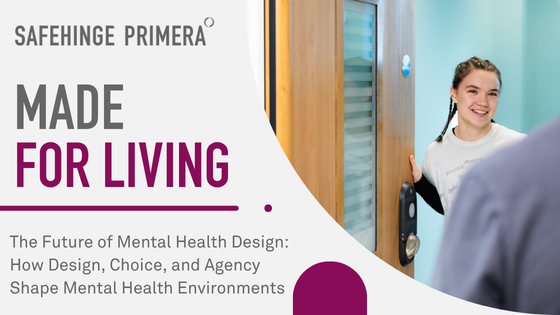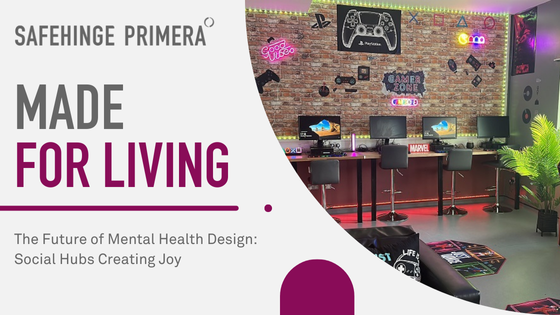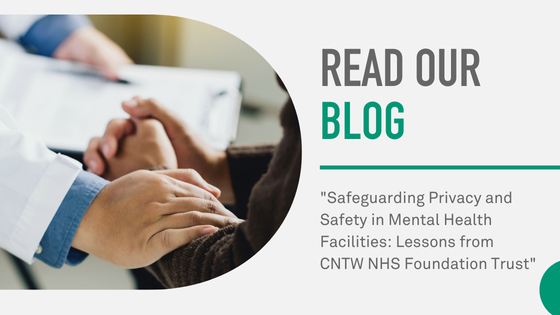by Philip Ross
It’s funny to write that it’s now 2025, a date I would hear as a kid growing up on Tomorrow’s World as the time when we’d have flying cars and robots helping us in our day to day lives. Whilst this might not be a reality, it’s safe to say that technology has made a huge difference in the way we do things.
In general healthcare, technology plays a huge role in helping nurses care, and yet here in mental health care, it’s still in the very early days.
Today, we're going to dive into how the latest technologies being explored across the mental health care spectrum can make a positive impact, as well as some areas of caution as we venture into uncharted territories.
.png?width=766&height=431&name=Email%20Header%201%20(8).png)
A New Era for Mental Care Health Services
The landscape of mental health services is shifting dramatically. Recent findings, such as those highlighted by the UK Research and Innovation¹ (UKRI), indicate that we're entering a new pioneering era. This involves the integration of cutting-edge technology and evidence-based strategies to support mental health initiatives. The ultimate goal? Create safer, more efficient, and user-friendly mental health environments and close the tech gap to traditional healthcare.
Smart Technology and Predictive Analytics
One of the most exciting developments is the implementation of smart technology in mental health facilities. Imagine a world where data-driven insights can support nurses and highlight when someone may be in the early stages of distress. We're not dreaming - this is becoming a reality thanks to predictive analytics.
Predictive analytics helps clinicians anticipate deteriorations in mental health conditions, enabling early intervention. According to the UK government's recent mental health data analysis guide, integrating behavioural data (eg. from low-wave radar or wearables) and clinical assessments presents an opportunity to identify patterns that could lead to proactive care.
For patients, this means reduced risk of major crises, fewer emergency interventions - less restrictive practice like having to restrain someone, and a more stable therapeutic experience. For mental health professionals, it means being able to prioritise care efficiently, focusing nurses’ time on the people who are most in need.
The Role of AI in Mental Health
Artificial Intelligence (AI) is often heralded as holding immense promise to revolutionise mental health care. With advancements in machine learning algorithms, AI can process vast amounts of data to help identify mental health trends and tailor treatments to individual needs. Think of it as having a digital assistant that analyses treatment outcomes and adapts therapies in real-time.
There is a range of AI-powered tools like chatbots and virtual assistants that offer an extra layer of support, providing users with immediate responses to their concerns - something that’s perhaps more suited to the generations more comfortable communicating via text messaging.
These tools have proven particularly beneficial in mitigating issues such as anxiety and depression, offering on-demand support that’s often more accessible than traditional counselling. However, this ease of availability must not cloud the judgement of whether it is as good as speaking to another human.
My own view is that AI has immense power as an aid to people within mental health care, it is not (and must not be) here to replace human judgement but to augment it. By assisting mental health professionals in making more informed decisions, AI ensures that patients receive the most appropriate care at the right time.
Virtual Reality (VR) as a Therapeutic Tool
VR is no longer confined to gaming; it's paving new paths in therapy. Virtual Reality has opened up innovative ways to treat conditions like PTSD, phobias, and anxiety disorders. Patients can immerse themselves in controlled environments that help in gradually desensitising fears and reducing anxiety.
Research by the UK Commons Library² indicates that VR sessions are being used in controlled settings. These applications allow therapists to customise scenarios, making therapy more personalised and informed by the person's specific traumas.
Digital Wellness Platforms
The accessibility and convenience offered by digital wellness platforms are encouraging more people to seek help. Apps like Headspace or Calm are leading the charge with their user-friendly interfaces and on-the-go wellbeing support that can reach the masses. However, the next wave of development is far more sophisticated, integrating aspects like cognitive-behavioural techniques and biofeedback directly into the user experience.
These platforms offer users the ability to track their stats over time, set wellness goals, and receive feedback. The wealth of data gathered is invaluable for both users and their healthcare providers, offering insights into mood patterns and therapy outcomes.
The BBC³ recently reported on the importance of these platforms in expanding access to mental health resources, especially for individuals who might face barriers to traditional care.
Ensuring Data Privacy and Ethical Use
While these technological breakthroughs are exciting, they bring concerns, especially about privacy and ethical use. It’s not just about the confidentiality of sensitive mental health data, but ensuring it is trauma informed/sensitive and that all these technologies never create a barrier to human connection - the only means of supporting someone at their most vulnerable time.
The Guardian reminds us that as we adopt these technologies, patient welfare must be at the forefront. Transparency in how technology works, the data it creates is used and ensuring user consent are steps towards building trust and fostering widespread adoption.
The Path Forward
Mental health has been neglected for too long when it comes to creating technology that supports our nursing and clinical teams on the front line. So, I’m pleased this is changing. However, as we embrace these technological advances, it’s important to carefully consider the impact on both patients and front line staff - as well as how this impacts their therapeutic relationship.
In conclusion, the integration of technology in mental health care isn't just a futuristic concept - it's happening now. The more we embrace this change, the more we can create safer, more supportive environments that truly benefit everyone. Here's to a future where mental health technology isn't just an add-on but a fully integrated support aid to help clinical teams provide the best possible care, and that people at their most vulnerable time recover quickly.
Thank you for listening, and feel free to share your own thoughts.
Philip Ross
Interested in learning more? Contact us to discuss how Safehinge Primera’s solutions can support your organisation’s goals.
References:
¹https://www.ukri.org/blog/a-new-era-of-pioneering-mental-health-research
²https://commonslibrary.parliament.uk/research-briefings/sn06988
³https://www.bbc.co.uk/news/topics/cwlw3xz04egt





